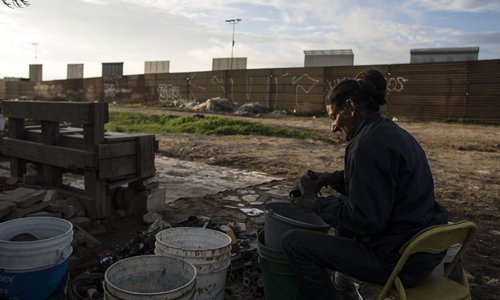Eladio Sanchez is unimpressed by the eight border wall prototypes looming over his house in the border city of Tijuana, Mexico, almost within spitting distance of where US President Donald Trump visited on Tuesday.

A woman on Monday works at her house on the Mexican side of the Mexico-US border in Tijuana, Mexico, from where prototypes of the wall US President Donald Trump wants to build on the border with Mexico are visible. (Photo: AFP)
At age 30, he has already snuck over the border several times, and doesn't expect Trump's wall will have much effect on undocumented migrants like him.
Pointing to the only prototype with an angular barrier at the top - a concrete structure built by Texas Sterling Construction Company - Sanchez says that one might slow him down a little more than the others.
But, he told AFP, "you can get over it anyway."
"It's just a little more complicated. But people are always looking for a way to get over - out of necessity, not because we want to."
In Tijuana, Trump's visit to the prototypes seems like the latest slap in the face from a man who launched his presidential campaign calling Mexican immigrants "criminals" and "rapists" and has since driven US-Mexican relations to their lowest point in recent memory.
It's as if "he wants to come just to tell us he's here, that he's going to do what he promised with the wall," says Sanchez, who lives in a small gray house in a poor neighborhood that juts up against the border, across from Otay Mesa, on the outskirts of San Diego.
'We will never pay'
Sanchez has watched the barrier between the US and Mexico grow over the years, blocking his view of the mountains more every time.
It started with a fence built under the Clinton administration, which was then beefed up with barbed wire.
"They just keep adding more, making it taller," he said while standing on his rooftop.
From there, he has an unimpeded view of the hulking prototypes, which stand about nine meters tall and cost between $300,000 and $500,000 each.
If Trump gets his way, and whichever prototype or prototypes win, a wall will certainly snake across much of the nearly 3,200-kilometer country border.
The cost is estimated at up to $20 billion, and Trump's insistence that Mexico will foot the bill is a source of national outrage.
Mexican President Enrique Pena Nieto reportedly canceled plans for a visit to Washington recently over the issue - the second time he has done so.
"He firmly repeated what all Mexicans have always said: We will never pay for a wall on the border," said Foreign Minister Luis Videgaray.
'Powerful energy'
An estimated 11 million undocumented immigrants live in the US, many of them Mexicans or other Latinos.
"They are the proof that it's possible to get through. More Mexicans are getting through all the time," says Sergio Tamai, the founder of immigrant advocacy group Angels Without Borders.
Tamai runs a shelter for migrants in the border city of Mexicali, which sits across from Calexico, California.
The Migrant Hotel, as it's known, is not far from the rusted metal border fence that separates the two cities. On the Mexican side, the fence is covered in colorful graffiti, including the words "penetrate me" in giant letters.
Migrants, Tamai says, will always find a way.
"The desert. The mountains. Human traffickers. You can't take away that desire to cross to the other side. That desire to build a better life for your family is such a strong, powerful energy."
'All alone'
For many Mexicans who have been deported from the US, things have gone from bad to worse under Trump.
"Everything is more difficult with Trump. He's really a racist," says Carmelo Alfaro, 56, sitting on a mattress on the floor in the Migrant Hotel.
He was deported recently after working for 15 years as a gardener in San Francisco.
He now plans to move back "all alone" to his native state of Jalisco, in the west of Mexico, and says he is resigned to living the rest of his life without his three US-born children. He and his wife decided their children would be better off in the US.
Salvador Moreno, the elderly deportee who cleans the hotel, is more optimistic.
A native of the western state of Michoacan, he was deported from California two years ago, and has since tried to go back twice. Both times he was arrested by the American border patrol.
"It's harder for us now," he says.
But, "God willing, I'll go back," he added.


